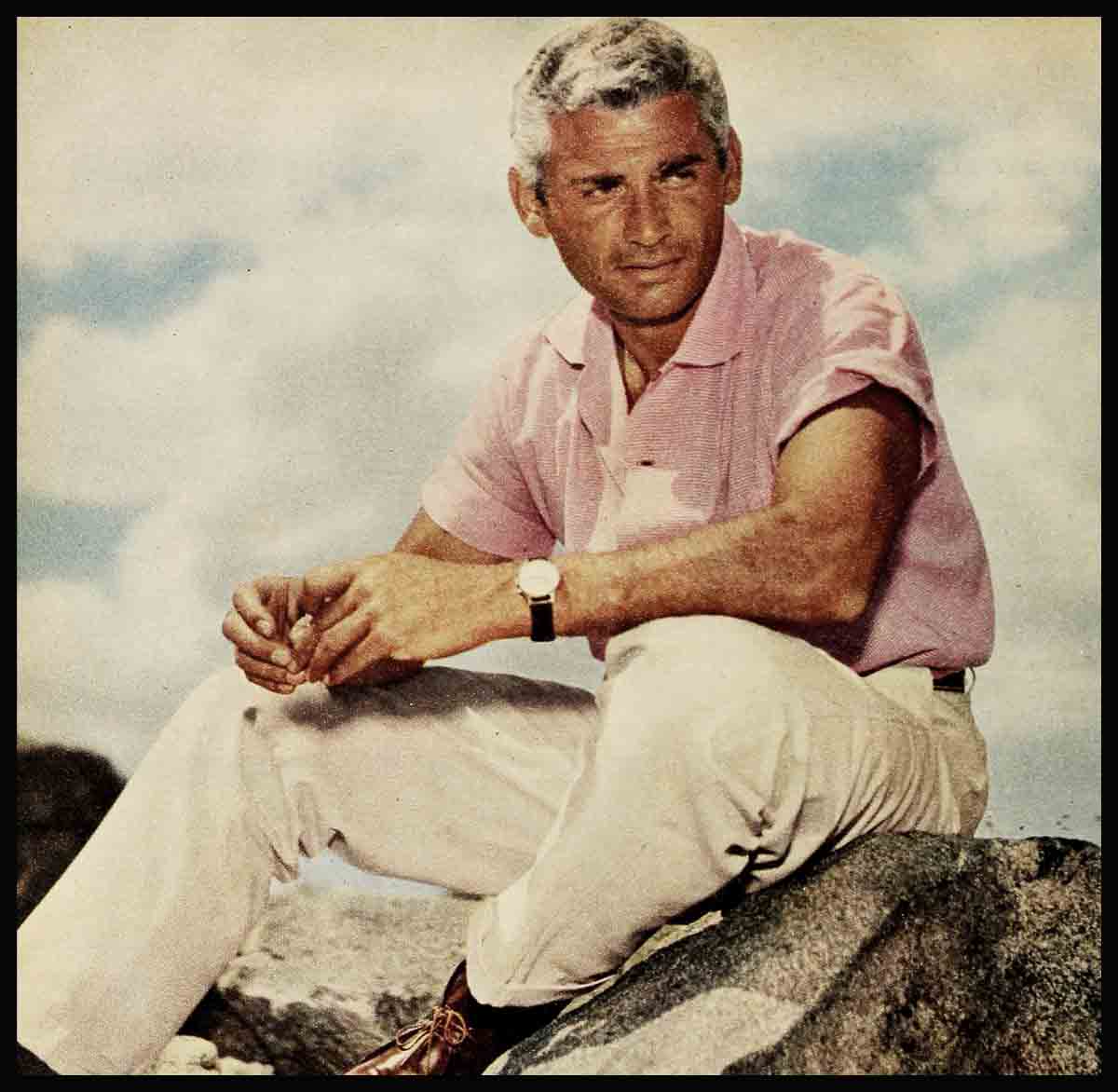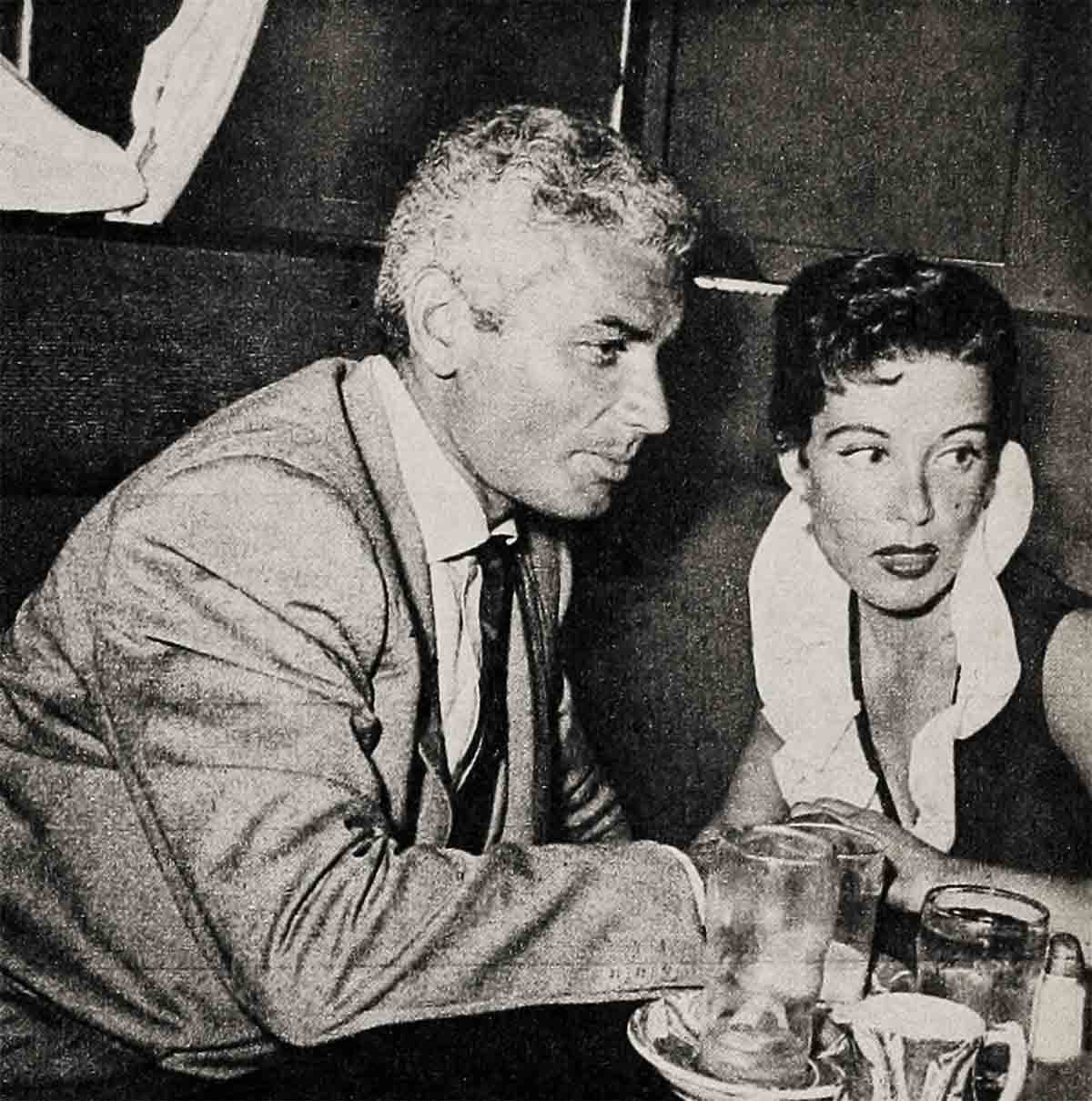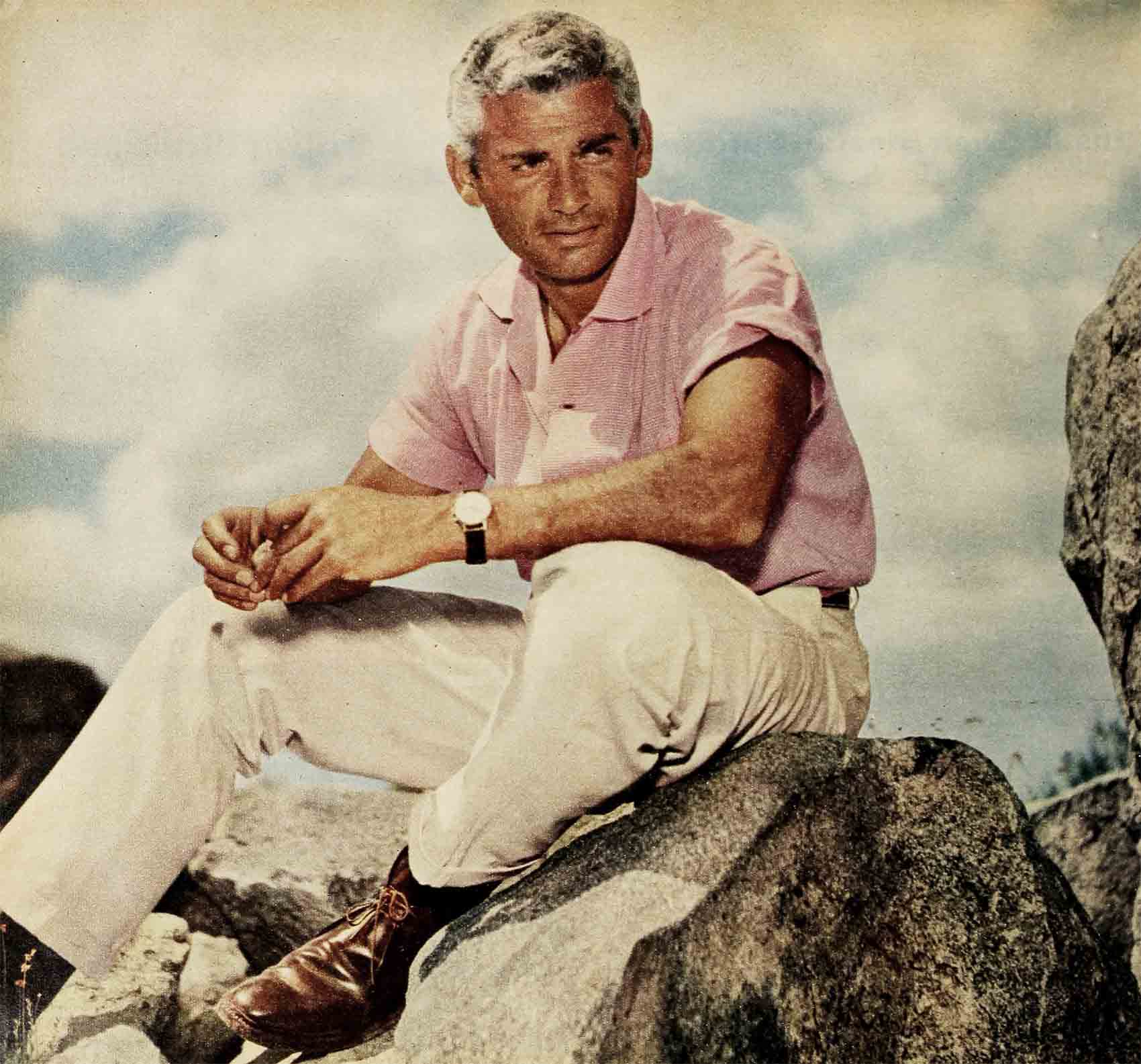
A Time To Work Things Out—Jeff Chandler
Jeff Chandler must rearrange his life, now. In his new kind of life, there must be a woman, sooner or later.
Most of Hollywood believes that woman will be pert, petite, beautiful Gloria De Haven. Jeff and Gloria have been going around together ever since their estrangements and divorces.
That they care deeply for each other is obvious. When Gloria recently opened at El Rancho Vegas, a swank nightery in Las Vegas, Jeff flew in from Hollywood to lead the opening night applause. A few weeks later when he was on location in Kingman, Arizona, making Foxfire with Jane Russell, Jeff again took off to visit Gloria on the week-end.
This jaunt from Arizona was supposed to be a surprise, but it backfired. When Chandler arrived in Las Vegas, he found that Gloria had another guest—Marty Himmel, the husband she was then in the process of divorcing.
The newspapers said that Marty and Jeff exchanged strong words, that the tall, burly actor invited Himmel to step outside and that while Gloria was singing to the cash customers, the two men in her life squared off. But Gloria says it isn’t true.
“I read in the newspapers, too, how Jeff and Marty were supposed to have fought over me. It’s a lot of bunk.
“Jeff happened to fly up to see me. I didn’t know he was coming. And Marty happened to fly in from New York. My divorce from Marty was very friendly and I was glad to see him. I was glad to see Jeff, too. There was no fight of any kind.
“After the week-end, Jeff flew back to his location and Marty went on to Los Angeles. Two weeks later I got my divorce from Marty.
“As to the future and Jeff—that’s hard to say. He’s a wonderful guy and I enjoy his company. He’s not hard to look at. He’s got a sharp but subtle sense of humor. And no matter what they write about his being moody and complex, I’ve never known him to take himself too seriously. You can’t say that about many actors.”
How does Jeff feel about Gloria?
Notoriously careful about discussing girls, all he will say is, “Gloria is as fine a young woman as I’ve met in this business. She’s sweet, she’s sparkling, she’s a lot of fun and she knows her way around.
“I like to be with her or I wouldn’t be seeing her. But we’ve both been through emotional upsets. My-divorce won’t be final until next year, and if I know Gloria, she doesn’t want to tie herself down, either. After all, she just got divorced.”

Still, Jeff Chandler is not one to lead a lonely life. Nor is he likely to turn sour on marriage because his first one failed.
“What I need most of all,” he says, “is time to work things out. Basically I’m a simple guy. I confront problems as they come along.
“I’ve got the kind of face that makes me look moody or miserable, so that people are always attributing deep and complex motivations to my behavior.
“They say that I’m carrying a torch for Marge (Jeff’s ex-wife) or that I’m pining away for Gloria or that there’s a big thing between me and Joan Crawford. They say that I’m lonely and in search of a wife.
“The only thing that I’ve been searching for lately has been a house on the desert and I’ve found it.” Two months ago Jeff decided that the Hollywood pace was too fast for him, so he moved out of his apartment in Westwood and rented a house in Apple Valley in the Mojave Desert.
It’s a small house with two bedrooms and a swimming pool. On week-ends when he isn’t working, this giant of a grey-haired actor races his Cadillac into Hollywood, picks up his two daughters, Dana and Jamie, and speeds back to his desert retreat. Here he plays and swims with them, cooks dinner for them or takes them to the Apple Valley Inn. And here he finds the peace which eluded him in Hollywood.
On Sundays Jeff gets his little girls back to Marge in time for dinner and then drops in to see Gloria De Haven.
If he has to report for work the next day he spends the night in his dressingroom at Universal-International. He uses the dressingroom as his town headquarters. But his home, he says, is Apple Valley, 104 long miles from the bright lights and the beautiful women of Hollywood.

How tone Jeff will go for the simple, quiet and solitary desert life, no one knows.
A friend of his says, “This desert kick Jeff’s on is just a stage. It’s a reaction.to his divorce. He can’t take it for any appreciable amount of time. He’s a-city boy, born and bred in Brooklyn. All of a sudden he’s crazy about the desert, in love with sand and driftwood.
“You want to know why? He’s tired of all those dames calling him up in Westwood. De Haven is something else again. He’s really stuck on her. But she’s not about to give up show business and even if she were, she’s not about to take her two kids and live twelve months a year in the Mojave Desert. I don’t care who she loves.
“Not that I’ve got anything against the desert, mind you. It’s a wonderful place for a couple of months. But I don’t think Chandler can take it all year round.”
Jeff says time will tell. That is why he rented a house instead of buying one. But he did spend $4700 for an acre and a half of land in Apple Valley, and if he doesn’t tire of the place, he plans to build his own house there next year.
His divorce will be final then and he will be in a position to marry again, which brings us back to Gloria De Haven.
Although she is not yet thirty, Gloria has been married and divorced twice.
Her first husband was actor John Payne, by whom she had two children, Kathy, eight and Tommy, six. Her second husband was wealthy New York contractor Marty Kimmel.
One reason these two marriages ended in divorce was that Gloria was not ready to renounce her career in favor of domesticity, a demand of both of her ex-husbands.

“Show business happens to be in my blood,” Gloria says, “and I just can’t get it out. Not yet, anyway. Jeff understands that and I’m sure he appreciates it.”
Gloria is the daughter of the late Flora Parker and Carter De Haven, one of the greatest of all the stage and screen teams of yesteryear.
She was sent to various dramatics schools, music academies and dancing schools. When she was twelve, David Selznick signed her to play Becky in Tom Sawyer. But by the time Selznick was ready to roll, Gloria had outgrown the part.
A few years later, director George Cukor who was a family friend, begged Gloria’s parents to let their daughter play a small part in Susan And God. “Just for the sake of theatrical tradition,” he urged. They said yes and Gloria was in show business.
She was a featured soloist with Bob Crosby’s orchestra, sang next with Jan Savitt’s band, and presently went to MGM for a role in Best Foot Forward. She played with June Allyson and Gene Kelly, Judy Garland and Van Johnson.
After her marriage to John Payne she went to work at U-I and Twentieth Century-Fox and then did a musical at RKO. Early this year she went to U-I and starred in So This Is Paris with Tony Curtis and Gene Nelson.
It happens that Jeff Chandler and Tony Curtis are close friends. One afternoon Jeff wandered onto the So This Is Paris set to see Tony and took one look at De Haven. One look is all that’s necessary.
Jeff’s growing interest in music added fuel to the fire. Sonny Burke, head of Decca Records on the west coast, had talked Jeff into singing some solos for the kids at Balboa Beach. Jeff had done so well that Sonny had offered him a Decca recording contract.
Gloria is under contract to Decca, too. So these two handsome people had something in common right from the very beginning—records, royalties, disc jockeys, Sonny Burke, orchestrations.
Jeff spoke about his first two recordings, “I Should Care” and “More Than Anyone.” He was afraid they’d flop.
Gloria said, “I don’t think so.” She was right. More than 150,000 copies have been sold so far.

Jeff was so encouraged that he began to do something he had always wanted to do—to write—“to create something out of my own imagination.” He wrote the lyrics to a melody and entitled them “That’s All She’s Waiting To Hear.” Then he recorded the song and backed it with “Lamplight.”
He made exploitation recordings for the disc jockeys and drove down to the Broadway department store in Los Angeles and autographed his records for hundreds of admirers. Gloria De Haven remained in the background, happy and glad at heart that he was finding himself with work that gave him satisfaction and stimulation.
Jeff Chandler is a paradox, and Gloria De Haven realizes it.
Jeff likes to say, “I’m lazy and all I want to do is sleep and take it easy.” But give him a modicum of spare time and he’s renting an office in Beverly Hills, organizing the Chandler Music Company, working on the plans for a series of Jeff Chandler comic books or doing research for a transcribed radio program he hopes to put on the air any day now.
Gloria understands this apparent contradiction because she herself is blessed or handicapped by the same nature.
“I’d love to be able to relax,” she says, “and just do nothing.” But the minute she has nothing to do, guilt assails her and she’s after her agent pleading for work.
Although they come from different backgrounds, Jeff and Gloria are two of the same kind. Superficially they appear phlegmatic. Inwardly they are both ambitious workers. Ambition is necessary for screen stardom but frequently the bugaboo of Hollywood marriages.
For example, it is commonly held that one of the reasons Jeff’s marriage to Marge Hoshelle failed was that Marge coveted fame and subconsciously resented Jeff’s success. Marge was under contract to Warner Brothers when she married Chandler eight years ago. He was completely unknown. As Marge took time off to bear his children, her career waned and his rose.
The same thing happened at the same time to Gloria De Haven and John Payne.
Gloria’s career was really gathering momentum in 1945. Following Best Foot Forward, MGM predicted that De Haven would achieve topflight stardom within a year. Gloria married John Payne and three months later she was pregnant. Temporarily, she abandoned her screen career, and because of that, MGM switched the buildup to another newcomer—June Allyson.
Gloria was having another baby and it wasn’t until the spring of 1948 that she was ready to return to screen work. By that time John Payne was the family breadwinner and Gloria De Haven was regarded as a promising performer who had passed up show business in favor of housework and child-rearing.
Gloria set out to disprove this allegation and to regain her former standing as a bright young actress. This led to arguments with John Payne and a divorce.
Gloria has learned from her past mistakes and so has Jeff. They aren’t kids any more. They have no intention of repeating the same errors. They fully realize the cares and responsibilities of marriage and the price, tangible and intangible, of failure.
So Jeff works almost all the time. He doesn’t play golf or tennis. He owns neither a plane nor a boat. He used to play a little softball once in a while.
Because he has achieved a fair degree of stability as a motion picture actor, he is currently concentrating on the things he’s always wanted to-do: writing, singing and living in the desert, knowing that financially he can afford the luxury of possible failure in these lines.
Jeff realizes that no matter how enthusiastic a man is about his new work, there comes a time when without the love of a good woman, life deteriorates into mere existence. He wants a complete life, and this must include a woman.
Since he started going around with bewitching, good-natured little Gloria, he has dated no other girl. And he seems to be happier than he’s ever been before.
Whether the romance will eventually lead to marriage or fade before Chandler’s divorce becomes final, no one can say for sure. But certainly at this point, Jeff and Gloria are making beautiful music together.
THE END
—BY ALICE FINLETTE
It is a quote. MODERN SCREEN MAGAZINE NOVEMBER 1954





No Comments